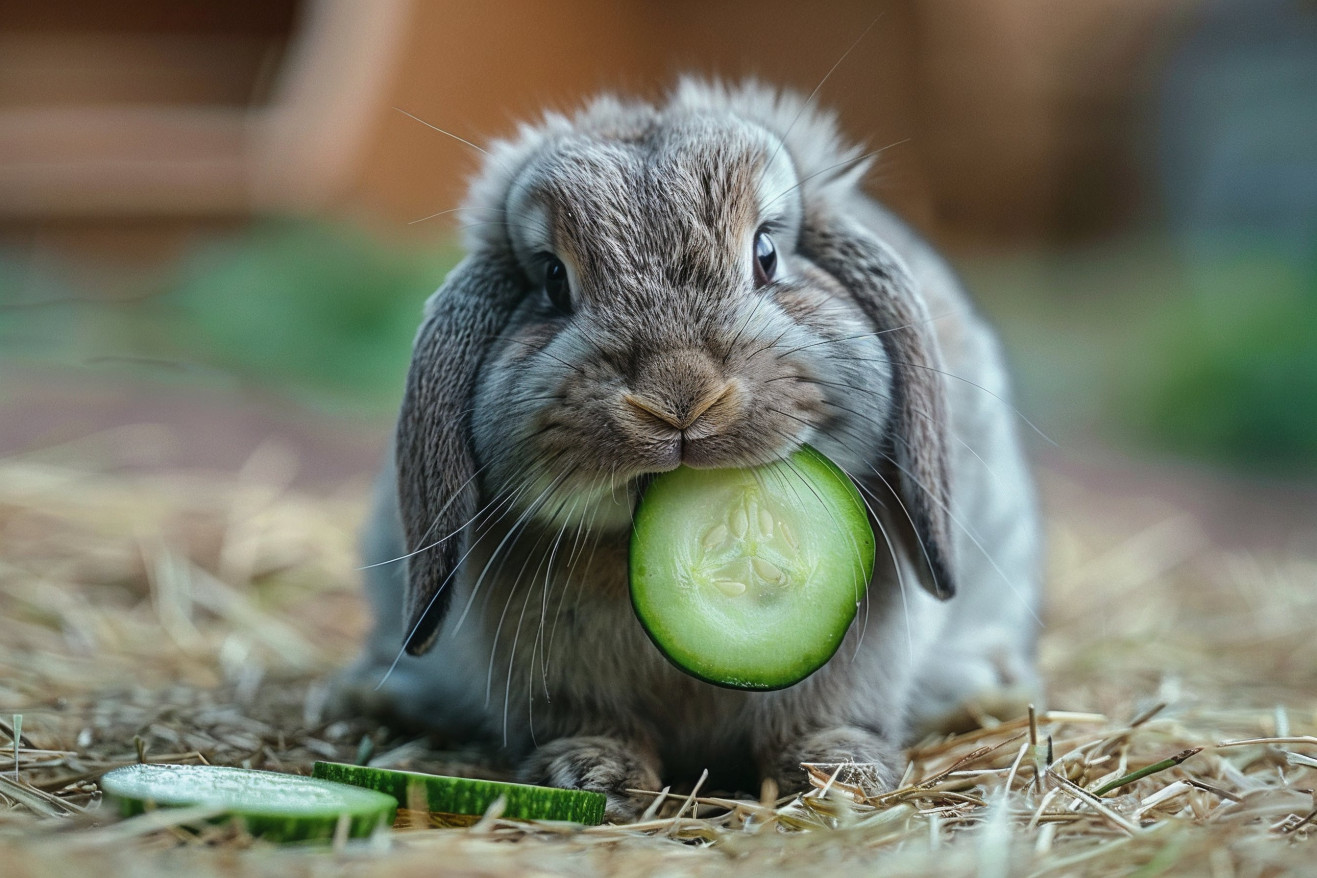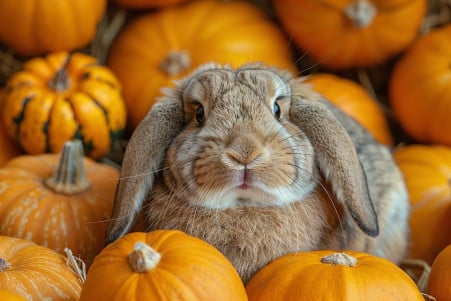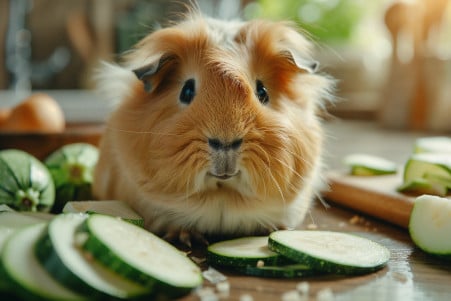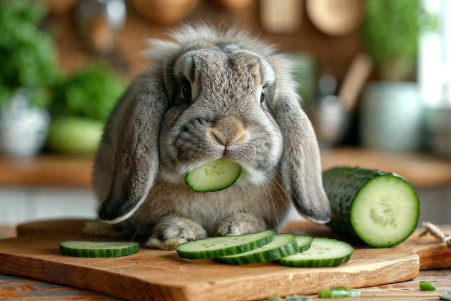Can Rabbits Eat Zucchini? Nutritional Benefits for Your Bunny
21 February 2024 • Updated 19 February 2024

Rabbits eat a wide variety of vegetables, but does that mean zucchini is safe for them to eat? The answer is yes, rabbits can eat zucchini as long as it is part of a well-rounded diet. Zucchini can help rabbits stay hydrated and provide them with important nutrients.
That said, it’s important to feed zucchini in moderation, which is about 1 tablespoon for every 2 pounds of body weight, and to introduce it slowly to avoid upsetting your rabbit’s stomach.
This article will review evidence from veterinary science, animal nutrition, and pet care recommendations to provide a comprehensive overview of the role of zucchini in a rabbit’s diet.
By looking at the nutritional content of zucchini and the nutritional needs of rabbits, we will determine whether zucchini is good for rabbits and their well-being. Our goal is to give you the information you need to make sure your pet rabbit’s diet is healthy and nutritious.
Can rabbits eat zucchini?
Nutritional Value of Zucchini and Its Benefits for Rabbits
As a type of summer squash, zucchini is packed with important nutrients that can benefit rabbits. Zucchini is a good source of several vitamins and minerals, including Vitamin A, manganese, Vitamin C, potassium, magnesium, Vitamin K, folate, copper, phosphorus, Vitamin B6, and thiamine. According to Healthline, one cup of cooked zucchini contains just 17 calories and a good amount of these nutrients, making it a low-calorie, nutrient-dense option for rabbits.
Zucchini’s fiber content is especially important for rabbits. With 1 gram of fiber per cup, zucchini can help rabbits digest their food, avoid constipation, and maintain a healthy gut. In addition, zucchini is made up of a lot of water, which can help rabbits stay hydrated. This is important because rabbits need to consume water regularly, according to the Merck Veterinary Manual.
That said, rabbit owners should be sure to feed zucchini to their pets in moderation, as introducing any new food too quickly can lead to digestive issues. While it’s unlikely that rabbits will be allergic to zucchini, WebMD suggests that pet owners be cautious when introducing this food to their pets because of the potential for allergies that comes with any food.
In addition, the antioxidants in zucchini, including lutein and zeaxanthin, may help support rabbits’ overall health by supporting important bodily systems like vision and the heart.
What Nutrients Does a Rabbit Need?
Rabbits require a specific balance of essential nutrients to be healthy, including water, protein, fats, carbohydrates, vitamins, and minerals. According to the Merck Veterinary Manual, water is the most important nutrient, and rabbits need to have access to it at all times. Protein is needed for growth and repair, and the amount needed increases during growth, pregnancy, and lactation, according to Companion Animals.
Fiber is an important part of a rabbit’s diet, and it helps maintain gastrointestinal health by supporting cecum motility and preventing GI issues like stasis, according to ScienceDirect. The dietary fiber in zucchini is relatively moderate, so it can help contribute to the high-fiber diet rabbits need without overwhelming their system. Carbohydrates are a source of energy, but they need to be carefully managed because high-starch diets can lead to obesity and enteric issues.
Fats should be consumed in small amounts since they are a source of essential fatty acids and help with vitamin absorption, according to ScienceDirect. Vitamins A, D, E, and K are all important, but A, D, and E need to be consumed directly from the diet, according to New Rabbit Owner.
Minerals like calcium and phosphorus are important, especially for bone growth, but too much of either can cause problems. Zucchini is a good choice because of its low-calorie content and essential nutrients, which make it a good fit for a rabbit’s diverse diet.
How to Introduce Zucchini into Your Rabbit’s Diet
Because rabbits can be sensitive to new foods, it’s important to introduce zucchini into their diet slowly. Give your rabbit a small piece of zucchini to start so that their digestive system can get used to it.
A-Z Animals recommends giving about 1 tablespoon of zucchini per 2 pounds of body weight per day. You can adjust this amount based on the size of your rabbit, but it’s important to make sure that the zucchini is a supplement to the hay and pellets that make up the bulk of your rabbit’s diet.
Rabbit Care Tips also recommends washing the zucchini thoroughly before giving it to your rabbit to make sure that any pesticides or chemicals are removed. They also recommend cutting the zucchini into thin slices so that it’s easier for your rabbit to eat. Like any new food, it’s important to introduce zucchini slowly and one at a time so that you can watch for any signs of an adverse reaction, including digestive issues.
While adult rabbits can eat zucchini, Rabbits Life notes that baby rabbits under 12 weeks old should not be given zucchini because their digestive systems are still developing.
Make sure that the zucchini you give your rabbit is fresh, and keep a close eye on your rabbit after you introduce it to look for any signs of an intolerance or health problem. If you notice any issues, stop giving your rabbit zucchini and contact your vet.
Benefits and Drawbacks of Zucchini for Rabbits
Vet Explains Pets notes that zucchini is made up of about 95% water, so it’s a great way to keep your rabbit hydrated. It also contains a range of vitamins, including vitamins A, C, and B complex, and minerals like magnesium and potassium, all of which support a rabbit’s immune system, bone health, and muscle health.
In addition, the fiber in zucchini supports healthy digestion, helping to keep the gut moving and reduce the risk of constipation.
That said, it’s important to feed zucchini to rabbits in moderation to avoid the potential downsides of overconsumption. Can Rabbits Eat It explains that overeating zucchini can lead to digestive issues, a point that The Bunny Hub also makes while noting that gas and bloating are also potential concerns.
Moreover, zucchini is high in oxalates, which can bind to calcium and contribute to the formation of bladder stones when consumed in large amounts over time, a fact that both sources mention.
For rabbits that need to lose weight, zucchini’s low calorie and sugar content can be helpful, and its crunchiness can be good for keeping a rabbit’s teeth from getting too long. However, it’s important to make sure that rabbits are getting a balanced and diverse diet and that zucchini is only being used as a supplement to their other food sources to ensure that they’re getting everything they need to stay healthy and well.
How a Rabbit’s Digestive System Works
Rabbits are fascinating animals with a digestive system that is specifically designed to process high-fiber foods, so it’s important to know how it works to keep your pet healthy. As hindgut fermenters, rabbits have a cecum—similar to a fermentation tank—that contains microorganisms that help digest fibrous materials, according to an article by Purina Animal Nutrition.
Fiber is important not just as a source of energy but also to maintain cecal motility and a healthy microbial population, which is important for overall gut health.
Rabbits are able to re-ingest important nutrients by eating cecotropes, which are nutrient-rich fecal pellets that are produced in the cecum through a process called cecotrophy, so their digestive system is very effective.
An article by Supreme Petfoods notes that rabbits need a diet that is high in fiber, which can be provided by feeding them plenty of hay and fresh vegetables like zucchini. Once the fiber from the vegetables, like zucchini, reaches the rabbit’s digestive system, it is fermented in the cecum, which helps to maintain the right balance.
However, when feeding rabbits new foods like zucchini, it’s important to be cautious so that you don’t upset this balance. An article by Companion Animals explains that new foods like zucchini should be introduced slowly to make sure that the rabbit can digest and absorb the nutrients without causing any stress to the rabbit’s gut.
If you are careful and considerate of your rabbit’s dietary requirements, you can feed them a variety of vegetables, including zucchini, and they will benefit from the nutrition that they provide as part of a balanced diet.
Final Thoughts: Zucchini as a Healthy Rabbit Treat
All in all, the trip through a rabbit’s diet has shown that zucchini can be a healthy and nutritious treat for our furry friends, as long as it’s given in moderation. We’ve learned about the nutritional benefits of zucchini, including its vitamins, minerals, and water content, as well as the importance of fiber in a rabbit’s diet.
We’ve also learned that slowly introducing zucchini and watching for any issues will help ensure a smooth transition and help you catch any problems early on.
It’s important to remember that balance is key when it comes to a rabbit’s diet. A good rabbit owner will make sure that their pet’s diet is well-rounded and meets all of their needs at every stage of their life. While zucchini can be a healthy part of that diet, it’s important to remember to keep portions in check and make sure that you’re still meeting your rabbit’s overall nutritional needs.
Good nutrition is a key part of keeping a pet rabbit healthy and happy. If you want to make sure that you’re meeting your rabbit’s specific nutritional needs, it’s always a good idea to talk to a vet. With the right information and support, you can help your rabbit live a long, happy, and healthy life.


